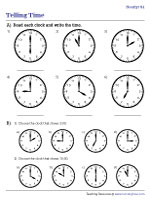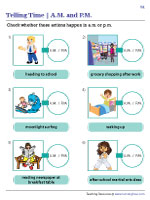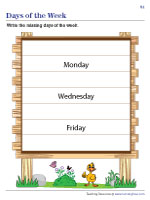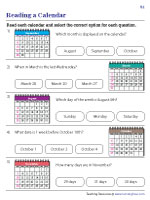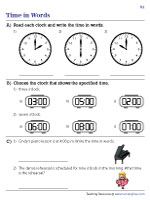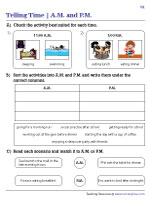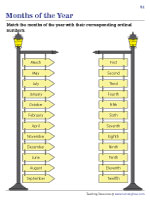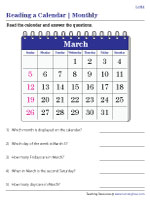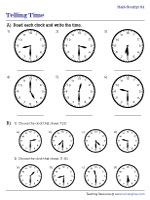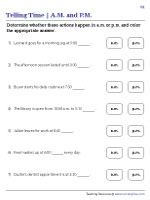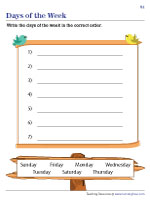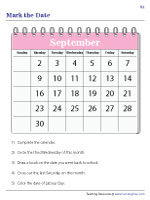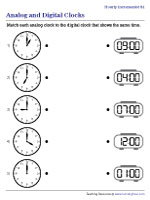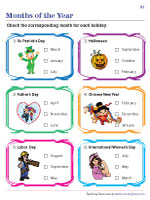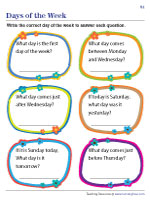1st Grade Math Worksheets
Explore our 1st-grade math worksheets with answer keys and exercises for kids to enhance their skills in extending forward and backward number sequences, solving addition and subtraction problems within 20, understanding place value and ordinal number systems, measuring objects with standard and non-standard tools, identifying and completing patterns, comparing sizes, telling time in different intervals, counting money, interpreting data from pictographs, tally charts, and bar graphs, and recognizing attributes of 2D shapes in geometry. Our free worksheets are beginner-friendly and a must-try!
Select Grade 1 Math Worksheets by Topic
Explore First Grade Time Worksheets
Read each analog clock, study the hour and minute hands, and record the time in part A. Choose the clock with the specified time in part B.

Examine the activity depicted in each picture and determine its occurrence at the usual time of day. Identify whether it typically occurs in the morning or afternoon.

Completing the Missing Days of the Week
A series of partially completed sequences are presented with some days omitted. Fill in the missing days and complete the sequence.

Reading Monthly Calendars Quiz
Test your ability to interpret monthly calendars by identifying dates, days, and events.

Writing Time in Words | O’clock
Convert digital and analog clock times into written words, such as "three o’clock" instead of 3:00. Read the scenario and communicate the time in written words.

Sorting and Matching Events to Before or After Noon
Read about each event, determine if it occurred before or after noon, and check and match accordingly. Also, organize events based on whether they occur before or after noon.

Refer and express months sequentially using ordinal numbers, such as "first" for January and "twelfth" for December.

Reading Monthly Calendars | Easy
Interpret the calendars to answer simple questions such as identifying specific dates, determining the day of the week for given dates, or recognizing the number of days in a month.

Telling Time in Half-Hourly Increments
Learn to read and write time in half-hour intervals, such as 2:30 or 4:00 in part A, and in part B choose the clock that tells the specified time.

Identifying and Shading Time Intervals | AM or PM
Leonard goes for a morning jog at 5:00. Determine whether the time intervals given in each scenario fall within AM or PM and shade accordingly.

Read the days in the word box and rewrite them in the correct sequence from Sunday to Saturday in the space given.

Completing Monthly Calendars and Marking Specific Dates
Analyze the calendar, fill in the missing dates, comprehend the questions, and highlight the specific dates on the calendar.

Matching Analog and Digital Clocks - Hourly Intervals
Match analog clock faces to corresponding digital time displays at hourly intervals and master time formats.

Months and Corresponding Holidays
Associate each major holiday with the month it falls in, such as Christmas with December and Independence Day with July.

Improve day-recognition skills by answering questions like name the second day of the week, the day before or after a specific day, or finding the day that falls between two given days.


 Interactive Worksheets
Interactive Worksheets Worksheets by Grade
Worksheets by Grade Number Sense and Operations
Number Sense and Operations Measurement
Measurement Statistics and Data
Statistics and Data Geometry
Geometry Pre-Algebra
Pre-Algebra Algebra
Algebra
